#Medical dermatology
Text
Dermatology and Mohs Surgery Skin Cancer Center in Springfield
Dermatology & Mohs Surgery Skin Cancer Center provides a wide range of dermatology services to meet your individual requirements.
Our team of dermatologists has the experience and expertise to provide the best possible care, whether you need medical dermatology, Mohs surgery, surgical dermatology, or cosmetic dermatology.
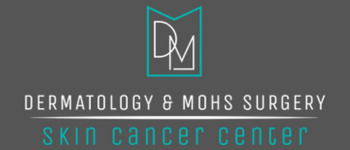
It is our goal to restore your healthy skin no matter what your specific condition may be.
1] Medical Dermatology - We treat conditions such as acne, eczema, psoriasis, and skin cancer through our medical dermatology services.
2] Mohs Surgery - The Mohs surgery removes cancerous tissue while preserving healthy ones, making it a highly effective treatment for skin cancer.
3] Surgical Dermatology - We offer Mohs surgery, excisions, biopsies, and more in our surgical dermatology department.
4] Cosmetic Dermatology - We provide a wide range of cosmetic treatments, including laser surgery, injectables, and chemical peels.

At Dermatology & Mohs Surgery Skin Cancer Center, we provide our patients with advanced and compassionate care through a team of board-certified dermatologists. Your treatment plan will be customized to meet your specific needs.
It is understandable that skin conditions can be difficult to deal with, so our goal is to provide the best care possible so that you can enjoy healthy and beautiful skin. Our dermatologist in Springfield can provide more information about skin diseases. Contact us today.
Dermatology & Mohs Surgery Skin Cancer Center
Address: 1230 E Kingsley St A, Springfield, MO
Phone: +1 (417) 336-0033
Website: https://www.dermatologyandmohssurgery.com/
#Mohs Surgery#Dermatology#Dermatologist#Dermatologist Springfield#Cosmetic Dermatology#Cosmetic Dermatologist#Surgical Dermatology#Medical Dermatology
2 notes
·
View notes
Text
Revitalize Your Skin: Medical Dermatology Services in Peru, IL!
Unlock flawless skin with our medical dermatology services in Peru, IL! From acne treatment to skincare consultations, let us rejuvenate your complexion. Schedule your appointment now and embrace a radiant glow!

#Dermatology Peru#Dermatology in Peru#Dermatologist Peru#Peru Dermatologist#Skin Cancer Center Peru#Medical Dermatology#Medical Dermatologist Peru#Skin Care#Skin Care Goals#skin rejuvenation
1 note
·
View note
Text
Experience Radiant Skin: Medical Dermatology Services in Bloomington, IL!
Unlock flawless skin with our exceptional medical dermatology services in Bloomington, IL. From acne treatments to skin cancer screenings, let us rejuvenate your skin. Book your appointment now and glow with confidence!

#Medical Dermatology#Dermatology#Dermatologist Bloomington#Dermatologist in Bloomington#Bloomington Dermatologist#Bloomington Beauty#Bloomington Health#Bloomington Skin Care#Skincare Solutions
1 note
·
View note
Text
Expert Medical Dermatology Solutions for Prime Skin Health
Explore top-tier medical dermatology services tailored for optimal skin wellness. Our expert team offers premier treatments, ensuring quality care for various skin conditions. Embrace Skin, a leader in dermatological solutions, provides advanced therapies and personalized consultations.
From acne management to anti-aging procedures, trust in our expertise for radiant, healthy skin. Remember, Mounjaro, a prescription medicine, is available online after consulting a licensed healthcare professional like your regular doctor or a diabetes specialist.

0 notes
Text
What to Expect During a Medical Dermatology Consultation?

Whether you're dealing with pesky acne, stubborn eczema, or even worrisome skin conditions like psoriasis and skin cancer, medical dermatologists are your go-to specialists. These highly skilled professionals are equipped with the knowledge and expertise to diagnose, treat, and manage a wide range of skin conditions that can affect people of all ages. So sit back, relax, and let's dive into the amazing realm of medical dermatology to discover how it can help you achieve healthy and radiant skin!
Common skin conditions treated by medical dermatologists
Skin conditions can be frustrating and sometimes even debilitating. Fortunately, medical dermatologists are equipped with the knowledge and expertise to treat a wide range of these conditions. Let's take a look at some of the most common skin conditions that medical dermatologists can help with.
Acne is perhaps one of the most well-known skin conditions, affecting people of all ages. Medical dermatologists have an arsenal of treatment options for acne, including topical creams, oral medications, and in-office procedures like chemical peels or laser therapy.
Eczema is another condition that medical dermatology can effectively manage. This chronic inflammatory skin condition causes redness, itching, and rash-like patches on the skin. Dermatologists may prescribe moisturizers, corticosteroids, or immunomodulators to alleviate symptoms and promote healing.
Psoriasis is characterized by rapid skin cell turnover, resulting in raised red plaques covered with silvery scales. While there is no cure for psoriasis, medical dermatologists have various treatments available to control flare-ups and reduce symptoms. These may include topical creams or ointments as well as systemic medications or phototherapy.
When it comes to skin cancer detection and prevention, medical dermatology plays a crucial role. Regular check-ups with a dermatologist can aid in early detection through thorough examinations of moles or suspicious lesions on the skin. Dermatologists also guide sun protection measures such as wearing sunscreen and protective clothing.
In addition to these common conditions mentioned above, medical dermatology can also address other issues like rosacea (a chronic inflammatory disorder causing facial redness) or hives (itchy welts triggered by an allergic reaction). With their specialized training in understanding the complexities of the skin's biology and functioning, medical dermatologists are skilled at diagnosing these conditions accurately.
Acne and its treatment options
Acne is a common skin condition that affects millions of people worldwide. It can leave individuals feeling self-conscious and frustrated, but the good news is that medical dermatology offers various treatment options to help manage and reduce acne breakouts.
One popular treatment option for acne is topical medications. These are applied directly to the affected areas and work by reducing inflammation, unclogging pores, and killing bacteria. Some commonly used topical treatments include benzoyl peroxide, salicylic acid, and retinoids.
In addition to topical medications, oral antibiotics may also be prescribed for more severe cases of acne. Antibiotics help decrease the number of bacteria on the skin and reduce inflammation.
For those who do not respond well to medication or have particularly stubborn acne, procedures like chemical peels or laser therapy may be recommended by a medical dermatologist. These procedures aim to exfoliate the skin's surface, unclog pores, and stimulate collagen production.
It's important to note that every individual's experience with acne is unique, so what works for one person may not necessarily work for another. That's why it's crucial to consult with a medical dermatologist who can assess your specific case and recommend tailored treatment options.
Remember, treating acne takes time and patience. It may require trying different approaches before finding what works best for you. With the guidance of a skilled medical dermatologist, you can take steps towards achieving clearer skin!
Eczema and how it can be managed through medical dermatology
Eczema, also known as atopic dermatitis, is a chronic skin condition that affects millions of people worldwide. It can cause redness, itching, and inflammation in various parts of the body. While there is no cure for eczema, medical dermatology offers several treatment options to help manage this condition.
One common approach to managing eczema is through topical medications such as corticosteroids or immunomodulators. These creams or ointments are applied directly to the affected areas and work by reducing inflammation and relieving itching.
Another option is phototherapy, which involves exposing the skin to controlled amounts of ultraviolet light. This treatment can help reduce inflammation and improve symptoms of eczema.
In severe cases where other treatments have failed, oral medications may be prescribed. These medications work from within the body to suppress the immune system's response and alleviate symptoms.
Medical dermatologists also emphasize the importance of proper skincare routines for individuals with eczema. This includes using gentle cleansers, moisturizing regularly with fragrance-free products, avoiding triggers like harsh chemicals or certain fabrics, and keeping nails short to prevent scratching and further irritation.
By working closely with a medical dermatologist who specializes in treating eczema, individuals can find relief from their symptoms and develop personalized management plans tailored to their specific needs. Regular check-ups ensure ongoing monitoring of the condition's progress and adjustment of treatment if necessary.
Remember that everyone's experience with eczema is unique; what works for one person may not work for another. That's why it's essential to consult with a qualified professional who can provide expert advice based on your circumstances.
Psoriasis and the various treatments available
Psoriasis is a chronic autoimmune condition that affects the skin, causing red, scaly patches to develop. It can be incredibly uncomfortable and have a significant impact on a person's quality of life. Thankfully, medical dermatology offers various treatments to manage this condition effectively.
One treatment option for psoriasis is topical medications. These creams or ointments are applied directly to the affected areas and can help reduce inflammation and control symptoms. Another approach is phototherapy, where the skin is exposed to controlled amounts of ultraviolet light to slow down cell growth.
For more severe cases of psoriasis, systemic medications may be prescribed. These medications work from within the body and target specific aspects of the immune system that contribute to psoriasis development.
In recent years, there has been an emergence of biological therapies for psoriasis treatment. Biologics are genetically engineered drugs that specifically target certain proteins in the immune system responsible for inflammation.
It's important to note that not all treatments work equally well for everyone with psoriasis. Each individual may respond differently based on their unique circumstances and needs. That's why it's crucial to consult with a medical dermatologist who can evaluate your condition and recommend the most suitable treatment plan tailored just for you.
Remember, managing psoriasis requires long-term commitment and regular follow-ups with your dermatologist as they monitor your progress and adjust treatment as necessary.
Skin cancer detection and prevention through medical dermatology
Skin cancer is a serious condition that affects millions of people worldwide. Fortunately, medical dermatology plays a crucial role in the detection and prevention of this disease. Dermatologists are trained to identify early signs of skin cancer and provide appropriate treatment options.
One of the most effective ways to detect skin cancer is through regular screenings performed by a dermatologist. During these screenings, the dermatologist will examine your skin for any suspicious moles or growths that could potentially be cancerous. Early detection is key in successfully treating skin cancer, so it's important not to ignore any changes or abnormalities on your skin.
In addition to screenings, medical dermatology offers preventive measures to reduce your risk of developing skin cancer. This includes educating patients about sun protection and proper skincare habits. Dermatologists can recommend sunscreen with high SPF, protective clothing, and advise avoiding excessive sun exposure during peak hours.
If you have already been diagnosed with skin cancer, don't panic! Medical dermatology provides various treatment options depending on the type and stage of the cancer. These may include surgical excision, cryotherapy (freezing), radiation therapy, chemotherapy creams or immunotherapy drugs.
Remember that prevention is always better than cure when it comes to health conditions like skin cancer. By visiting a medical dermatologist regularly and following their advice for sun protection, you can significantly reduce your risk of developing this potentially life-threatening disease.
So don't hesitate – schedule an appointment with a medical dermatologist today for peace of mind knowing that you're taking proactive steps towards keeping your skin healthy and free from harm!
Other conditions that can benefit from medical dermatology, such as rosacea and hives
Rosacea is a chronic skin condition characterized by redness, flushing, and visible blood vessels on the face. It can also cause bumps or pimples to form on the skin. While there is no cure for rosacea, medical dermatologists can help manage the symptoms through various treatment options. These may include topical creams or gels to reduce inflammation, oral medications to control redness and swelling, and laser therapy to minimize visible blood vessels.
Hives, also known as urticaria, are itchy welts that appear on the skin in response to an allergic reaction or other triggers such as stress or temperature changes. Medical dermatologists can provide relief for individuals suffering from hives by prescribing antihistamines or corticosteroids to reduce itching and inflammation. They may also recommend identifying and avoiding triggers that could be causing the outbreaks.
By seeking care from a medical dermatologist for conditions like rosacea and hives, patients can experience improved quality of life with fewer flare-ups and better management of their symptoms. So if you're dealing with either of these conditions, don't hesitate to reach out for professional help!
Importance of regular check-ups with a medical dermatologist
Regular check-ups with a medical dermatologist are essential for maintaining the health of your skin. Just like any other part of your body, your skin requires proper care and attention to prevent and treat various conditions.
During these check-ups, a medical dermatologist can assess the overall condition of your skin and identify any potential issues before they become more serious. They can examine moles, spots, or abnormalities to detect early signs of skin cancer.
Additionally, regular visits to a medical dermatologist allow you to discuss any concerns or questions you may have about your skin's health. They can provide personalized advice on skincare routines and recommend treatments or products that are suitable for your specific needs.
Moreover, if you have an existing condition such as acne, eczema, or psoriasis, routine check-ups enable the dermatologist to monitor its progress and adjust treatment plans accordingly. This proactive approach helps in managing chronic conditions effectively.
Furthermore, by regularly visiting a medical dermatologist, you benefit from their expertise in diagnosing and treating various skin conditions. They stay up-to-date with the latest advancements in dermatology and possess specialized knowledge that ensures accurate diagnoses and effective treatment options.
In conclusion (without using "in conclusion"), regular check-ups with a medical dermatologist play a vital role in maintaining healthy skin throughout your life. By taking proactive measures through routine visits, you give yourself the best chance at early detection of potential issues along with receiving expert guidance on skincare practices tailored specifically for you!
In this blog post, we have explored the world of medical dermatology and its ability to treat a wide range of skin conditions. From acne to eczema, psoriasis to skin cancer detection, medical dermatologists play a vital role in helping individuals achieve healthy and beautiful skin.
With numerous treatment options available for each condition, there is hope for those struggling with their skin health. Whether it's topical creams and medications or more advanced procedures like laser therapy or surgical interventions, medical dermatologists have the expertise to tailor a treatment plan that suits your specific needs.
Regular check-ups with a medical dermatologist are essential not only for diagnosing and treating existing conditions but also for preventive care. Through routine examinations and discussions about skincare routines and habits, these specialists can help identify potential issues before they become major concerns.
Remember that taking care of your skin goes beyond just vanity – it is an integral part of overall health. So if you're experiencing any concerning symptoms or simply want to improve your complexion, don't hesitate to reach out to a trusted medical dermatologist who can guide you on your journey towards healthier skin.
Take control of your skincare today by seeking the expertise of a medical dermatologist – because when it comes to achieving optimal skin health, professional guidance makes all the difference!
Note: This article is provided for informational purposes only and should not be considered as medical advice. It is always recommended to consult with a qualified healthcare professional regarding any specific concerns or questions related to one's health or skincare regimen.
0 notes
Text
Medical Dermatology: Skin Care
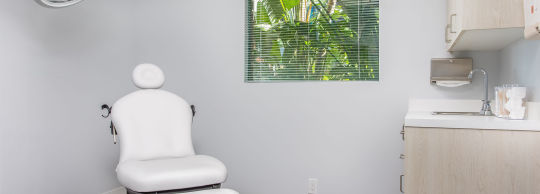
Cal Coast Dermatology offers a full range of medical dermatologic services for all ages. The comprehensive care we provide is in conjunction with your other specialists and primary care physician. We diagnose and treat a wide variety of skin conditions. Scroll below to learn more about many commonly treated skin conditions.
Visit Us - https://www.calcoastdermatology.com/medical
0 notes
Link
Treatment
Hyperhidrosis is treated by making certain lifestyle changes. A person should:
Avoid wearing tight fitted clothing
Avoid triggers that can make the condition worse
Avoid wearing black clothes
Wear light and loose clothing
0 notes
Text

For more information on Microneedling, or to schedule a consultation, be sure to contact Pura Dermatology today.
0 notes
Text
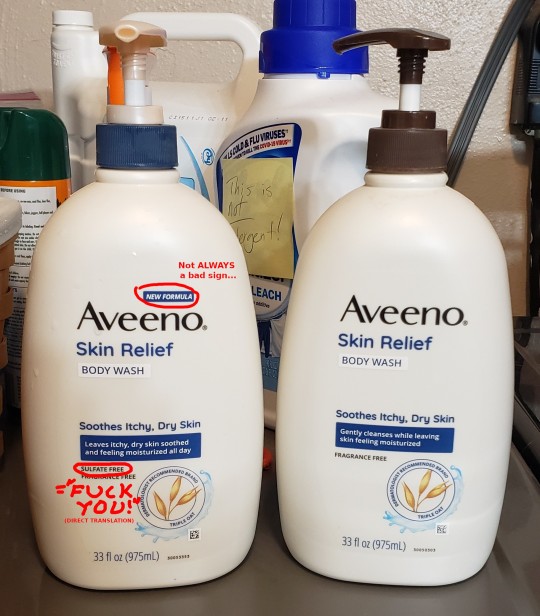
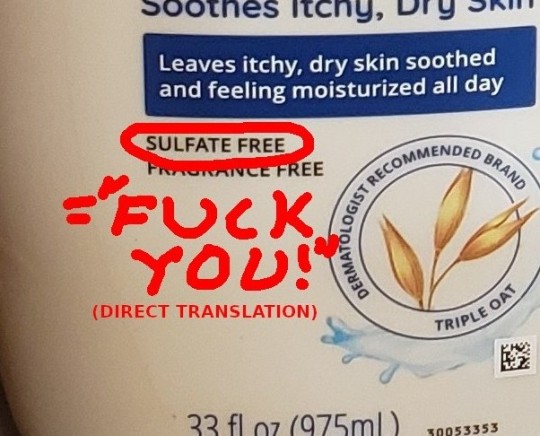
May have just figured out why the lesions have been getting worse! I got the new bottle in early December.
TL;DR, sulfate-free cleansers tend to require more scrubbing for effective cleaning/rinsing. This isn't good for people with skin conditions that are aggravated by friction. Which is, practically-speaking, most people with skin conditions!
And since this cleanser is marketed towards people with "Itchy, Dry Skin" (major symptom of eczema), reviews since the formula change in November have been almost 100% negative. Most reviewers aren't sure why it's now irritating their skin, but they know that it is.
(Notably, in my case, hidradenitis suppurativa-affected hair follicles can easily become inflamed to the size of a thumbnail if the hair gets tugged on too hard. However, since HS also affects the skin's ability to fight off infection, failing to clean the area well enough is dangerous, too! Sulfate-free products are trying to kill me.)
69 notes
·
View notes
Text


POV : you find the best spot in the library ( I can see these beautiful trees from the windows and that’s the definition of best spot for me) 🌲
Also dermatology is giving a hard time these days 🙂↕️
#studyblr#med life#medicine#studyspo#studygram#study motivation#dermatology#med student#medical studyblr#med student community#medblr#library#examstress#exam preparation#college studyblr#medschool#100 days of productivity#linastudyblrsblog
31 notes
·
View notes
Text

Dotted baby. Delineations of cutaneous diseases. 1817.
"White Gum...exhibits hard, whitish pimples...frequently unaccompanied by any disposition."
Internet Archive
88 notes
·
View notes
Text
Oedema - pitting vs non-pitting
Oedema is swelling due to excess fluids in tissues.
In pitting oedema, pressing on the affected area leaves an indentation (that persists after removing the pressure). In non-pitting oedema, the area feels firm to touch and does not form indentations.
Pitting oedema:
The excess fluid is mainly composed of water
Commonly caused by heart failure, venous insufficiency, or nephrotic syndrome
Non-pitting oedema:
The excess fluid consists of water WITH protein and salts
Usually indicates a condition of the thyroid / lymphatic system
Different types:
Lymphoedema is due to a build-up of lymphatic fluid (e.g. due to a tumour blocking lymphatic flow / after removal of lymph nodes).
Myxoedema occurs in hypothyroidism and often affected the pretibial or periorbital area.
Angioedema is localised swelling of the skin and is usually due to allergic reactions. It typically affects the face, tongue, larynx, abdomen, arms, and legs. When the larynx is affected, it may affect breathing, which is an emergency!
Lipoedema is when fat accumulates in subcutaneous tissues - it usually affects the legs/buttocks and almost exclusively occurs in postpubertal females (not the same as cellulite!)
If patients present with oedema, it's always important to test if it's pitting or non-pitting as this helps to determine the cause and correct treatment!
#med school#medical student#medicine#revision#medspo#medblr#dermatology#renal#cardiology#oedema#pitting#non-pitting#heart failure
31 notes
·
View notes
Text
In other news broke down in front of my associate consultant yesterday when she asked me how work was going because I told her that while I can manage the usual (already ridiculous) 33 patients in four hours and 24 patients in 3 hours just about ok, I dreaded becoming a senior resident after summer next year and having to constantly see 38 patients in 4 hours because I would have to compromise care or stop giving patients the time they want to process
She responded by saying that she actually thought I was pretty efficient and addressed patient problems well.
Which was. You know. Encouraging. But doesn't change the fact I'm currently having to see a patient every 6 minutes to factor in things like lab results and next year that'll turn into a patient every 5 minutes.
For an average of 3 complaints each.
#medical systems are always close to collapsing if the doctor-patient ratio doesn't work out#people burn out and go to private practice and new people come in and burn out again#it's a vicious cycle#also I'm doing this 5.5 days a week while doing a dermatology diploma and again attempting mid residency exams next year#so.#medicine#doctor#personal#medical happenings#my post
13 notes
·
View notes
Text
Mandana just took the initiative to sniff out the exact spot on my face I’m going to have biopsied in October so that was fun & not concerning at all 😐
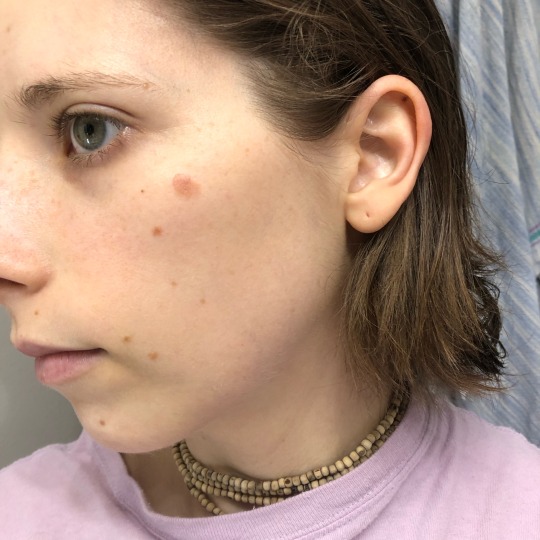
17 notes
·
View notes
Text
So, I have this dermatologist appointment tomorrow, and I'm feeling pretty nervous about it. Let me give you a little backstory on why this is such a big deal for me. See, ever since I was a kid, I've had to deal with health issues on my own. My mom always believed that going to the doctor for small issues was pointless, and I understand where she's coming from. I mean, why bother a busy doctor with something that seems trivial, right?
But I think it's because of that upbringing that I developed this kind of aversion to doctors in general. It's not that I don't see the importance of seeking medical help when needed, but there's always this lingering feeling of unease whenever I have to face a doctor. Maybe it's the fear of being judged or feeling like I'm wasting their time, I don't know.
But hey, time to put my big girl pants on and face the world, cause sometimes it’s hard getting things done when you’re naturally a loner. <3
#mine: text#dermatology#dermatologist#doctors appointment#medical field#rambles#tbh i'm really close to fraking out and cancelling#but i know if i don't do this i'm going to constantly whine about all the issues i keep having
8 notes
·
View notes
Note
i’m a med student too! fourth year, and i wanna go into pediatrics maybe, but i thought about anesthesiology too
-🐭
oh cool! my mom’s an anesthesiologist and i thought ab that too. i love anesthesiology tbh, i love studying drugs and i love helping my mom with it in the or, but i gave up on it cause it’d mean working with surgeons 24/7, and i hate surgeons lol. and since i love pharma so much, i thought ab psychiatry, but it’s too boring. so i have absolutely no clue what i’m gonna do
#asks#🐭anon#honestly my family’s a medical specialty bingo#just in my close family like parents and aunts there’s like#anesthesiology general surgery pathology ophthalmology dermatology psychiatry#that’s all i can remember rn fkvkbk
2 notes
·
View notes